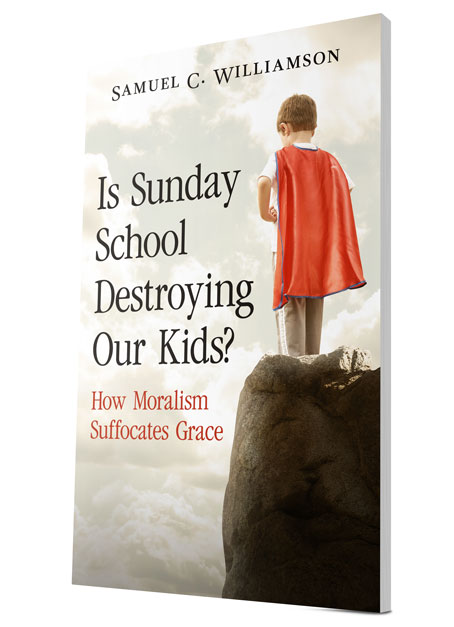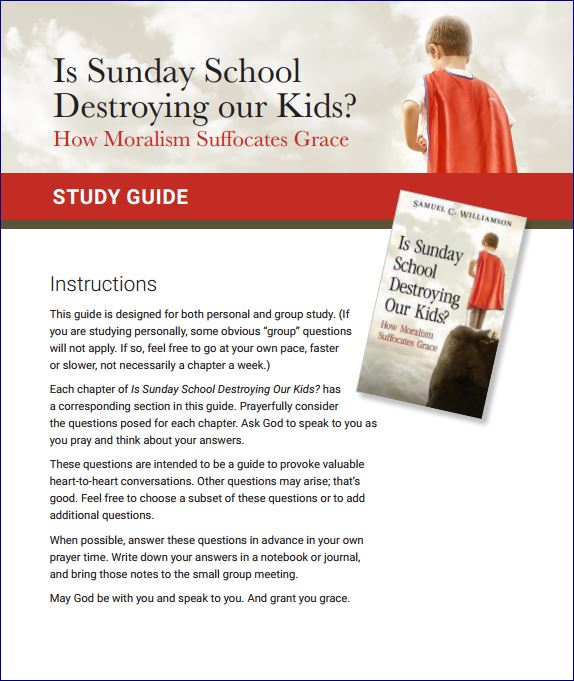Ten years ago, a Christian friend described how he was beginning to bring the gospel to his softball team. He had just joined the local league, partly for the fun of the game and partly to meet non-believers outside his Christian bubble.

However, he felt uncomfortable with his teammates’ cussing during practices and games. He asked them if they would stop, at least while he was with them.
They agreed and stopped (for the most part). He deemed this “cleaner language” an evangelistic victory. It hinted that his teammates might be choosing the right path. He felt that the gospel had been advanced.
Next, he planned to ask them to stop drinking.
Something about my friend’s story felt discordant. I didn’t sense anyone was closer to God. And the more I thought about it, the more I felt the gospel had been corrupted.
But I Wasn’t Sure Why
The world is filled with brokenness and oppression. We should be men and women who fight for justice and love our neighbor as ourselves. But those activities aren’t the gospel.
Linking the cessation of cussing to accepting the gospel unsettled me. It was like a slightly off-key singer or an out-of-tune instrument. The soft dissonance of my friend’s story continued to disturb me. I couldn’t shake it. But I wasn’t quite sure why.
Then I heard someone critique the modern version of the gospel. He said the modern gospel is:
Sin less. Work harder. Give more.
And that’s just wrong. It is a counterfeit gospel, and counterfeits succeed only when they look like the real thing. The problem with the false gospel portrayed above is that everyone smitten by the gospel will sin less, and will work harder, and will give more.
It’s just not the gospel. It’s a result of the gospel, but it isn’t the gospel.
It’s Also Not Just a Modern Counterfeit
I’ve asked scores of people (believers and non-believers) who the greatest enemies of Jesus were. Virtually everyone says the same thing: the enemies of Jesus were the Pharisees, scribes, and the religious leaders of the day.
No one—not one person—said that the greatest enemies of Jesus were the tax collectors, prostitutes, or adulterers (or cussers).
Isn’t that weird? People of all religions—even non-religious people—consider Jesus to be a great moral teacher. Yet his greatest enemies were the moralists, and some of his best friends were society’s sinners. It is upside down. Wouldn’t a moral teacher’s friends be the most moral and his enemies be the most sinful?
When asked by Pharisees about his upside-down living, Jesus answered,
Healthy people don’t need a doctor—the sick do … I came to call not those who think they are righteous, but those who know they are sinners. (Matt. 9:12-13)
Jesus didn’t say that the Pharisees were healthy and the tax collectors were sick. He said (in effect) that the tax collectors knew they were sick while the Pharisees, in their arrogance, mistakenly thought themselves healthy.
Some readers are going to say I’m against morality. I’m not. I wish everyone in the world were a thousand times more moral. (Including you and me.) But in our morality we need to be cautious. It can lead us—ever so slowly—to feel good about ourselves, which can lead us—ever so slowly—to self-righteousness. Which is the enemy of the gospel.
Another very modern counterfeit gospel is when we say, “I’m not so bad. I’m okay, you’re okay.” But it’s a modern version of the ancient Pharisee. We don’t see our need. The difference between the sinners and Pharisees was that the sinners knew their need.
It is that independent, self-righteousness that is killing the world.
Identifying Counterfeits
One way the Secret Service trains agents to spot counterfeits is for the agents to spend lots of time handling genuine currency. The best way to spot a counterfeit is to know the real thing. So, what is the real gospel?
- The gospel is not us being good so God will like us; it is God loving us despite our brokenness and sin. All we need is need.
- The gospel is not us showing God our good report card; it is Jesus living a perfect life and giving us his good report card as our own. All we need is need.
- The gospel is not us emptying our bank accounts to give to God; it is God pouring out his riches on us, the morally bankrupt, to make us rich. All we need is need.
- The gospel is not us cleaning up our acts or our families or our relationships or our mouths; it is God cleaning them up for us. All we need is need.
The gospel is like a two-sided coin: we are more wicked than we have ever dared admit; and we are more loved than we ever dared imagine. When we admit we are needy—in real need of a heart transformation—then receiving such undeserved love changes us, it gives us the needed transformation.
When we can admit that we are really no better than anyone else AND that we are also incredibly loved, then (and only then) we can instinctively love those around us who don’t live up to our moral standard.
Because—like everyone else—we didn’t live up to them either.
But He loved us anyway; because He always loves the needy. At least those who admit their need.
Sam
++++++++++++++++++
This post is an excerpt from my book, Is Sunday School Destroying Our Kids. People in the world often reject Christianity simply because they can’t distinguish it from mere morality.
The world needs morality–oppression thrives when consciences are abandoned–but we need more than morality alone. We need the gospel of grace. A gospel that has largely been lost amid the dos and don’ts and preoccupations of religious culture.
Join thousand of other readers who have delighted in this short, story-filled, thought-provoking book on grace.
The book is accompanied by a twelve-week Study Guide, filled with questions for reflection and exercises for growth; perfect for small groups or personal meditation. To download free Study Guide, Click Here (or on the image to the left).
Click here for a PDF of commonly asked questions about this book: Frequently Asked Questions



 The Ugliness Of Religious-Righteousness
The Ugliness Of Religious-Righteousness
Bună dimineața, Sam,
It seems that one can focus on „upholding Christian values”–without needing to deal with that disruptive Jesus.
O zi bună.
Hi, Sam. Long time no see.
Excellent article, it really helps to be reminded of God’s Grace when one feels defeated by one’s own failings.
Thanks
Excellent article. Amen, Brother!
I would have loved to eaves drop on what Jesus said at those dinner parties! It is a delicate balance to love the sinner but hate the sin.
Yes! Amen! I keep coming back to the rich young ruler in my own devotions for the same reasons. I was taught in Sunday school that he missed out because he loved his money more than Jesus, but I am convinced now that he missed out because of his self-sufficiency! He was moral, and he was “blessed” with wealth. His need was nonexistent in his eyes, and yet something tugged at his heart, something that Jesus had to offer that he didn’t have. The prescription from Jesus was to abandon his own sufficiency and realize his true need, as He does with us all. It is not money that makes it difficult for the rich to enter the kingdom, but an attitude of “being rich” blocks us from begging for salvation. All we need is need. Love it!
I think the morality emphasis could be birthed out of the assumption that everyone in the group is a Christian believer. This could have been true for many friendships in 1920, 1930, 1940…1965; and then many believers could mistakenly think that *nothing had changed*, that there was still a “Christian consensus”, that this was still a Christian Country. Especially if you’re playing on a church softball league, where people *don’t* need to get saved, they need to abandon gross sins.
My analysis comes from trying to think through the political world of 1980s-1990s, with the group Moral Majority (my best friend at work was the state president), along with the left wing backlash against Christians who “just hate abortion and pornography,” and so forth. The Left/Progressive/Democrats/Secularists hated Christians being involved with politics. It sounded to me like the “critical mass” of politically oriented Christians were assuming that most people were already Christians and just needed to tidy things up a bit, and I’m thinking of both Catholics and Bible Believing Christians such as James Dobson. The more astute ones, e.g., Francis A Schaeffer and Chuck Colson, knew it wasn’t that simple, and that “working for revival isn’t a plan” but single issue politics with adequate leadership *could* be a plan to stem a snowballing crisis already underway. But as always, nuance is wasted on the masses.
Thank you, Sam, as always. Even a bed pan can be made to shine on the outside.
Your comments remind me of another counterfeit belief. WWJD evangelizing. How misguided to think we can follow a formula or think we are sanctified enough to know the mind of God in reaching a particular unbeliever. That is the work of the Holy Spirit’s guiding and his touch on the listener’s sole.
Our involvement may be silent, tender soft, loving or it may be figuratively speaking a whip of cords. Our role is to listen as best we are able and to obey. God is in charge of the results.
“He said (in effect) that the tax collectors knew they were sick while the Pharisees, in their arrogance, mistakenly thought themselves healthy.”
Did he, though?